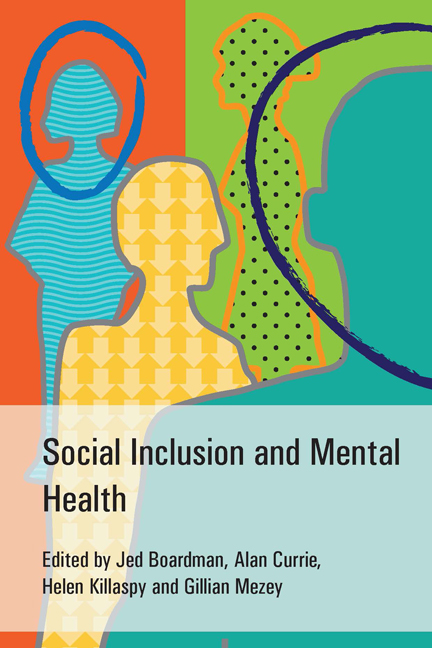Book contents
- Frontmatter
- Contents
- List of contributors
- List of tables
- Foreword
- Preface
- Acknowledgements
- Scoping Group on Social Inclusion, Royal College of Psychiatrists
- Part 1 What is social exclusion?
- Part 2 Social exclusion: the scope of the problem
- Part 3 Working towards inclusive psychiatry
- 13 Social inclusion: research and evidence-based practice
- 14 Implications of social inclusion for individual practice
- 15 Socially inclusive mental health services: what will they look like?
- 16 Training for socially inclusive practice
- 17 Community mental health and the inclusion–exclusion seesaw
- 18 Socially inclusive practice and psychiatry in the 21st century
- Index
18 - Socially inclusive practice and psychiatry in the 21st century
from Part 3 - Working towards inclusive psychiatry
- Frontmatter
- Contents
- List of contributors
- List of tables
- Foreword
- Preface
- Acknowledgements
- Scoping Group on Social Inclusion, Royal College of Psychiatrists
- Part 1 What is social exclusion?
- Part 2 Social exclusion: the scope of the problem
- Part 3 Working towards inclusive psychiatry
- 13 Social inclusion: research and evidence-based practice
- 14 Implications of social inclusion for individual practice
- 15 Socially inclusive mental health services: what will they look like?
- 16 Training for socially inclusive practice
- 17 Community mental health and the inclusion–exclusion seesaw
- 18 Socially inclusive practice and psychiatry in the 21st century
- Index
Summary
In this book we set out to define social exclusion in the context of people with mental health problems, look at how such people are excluded, why this matters to psychiatry and what can be done to improve their inclusion. Central to social exclusion and inclusion is the idea of participation in the key activities of society and this has brought us to the importance of: agency and the social barriers to inclusion, especially stigma and discrimination; the multiple causes of exclusion and their dynamic impact over the life course; the role of equality, human rights and citizenship; and the importance of social capital, support and networks. Many of these concepts are also embedded in the principles of recovery.
We have found that people with mental health problems and those with learning disabilities are excluded on a range of different indices and some, particularly those with long-term mental health problems, are more likely to be excluded than others. The implications of the exclusion of many people with mental health problems for psychiatry are manifold, but the experience of exclusion is profoundly negative, has consequences for health and well-being, and carries a high cost for society and individuals. However, this does not have to be the case and psychiatry and mental health services can have a positive impact on the problems of exclusion. This final chapter will give an overview of the arguments, examining where we stand now and how policy and practice will need to change in the future.
Social changes and exclusion
When Joseph Rowntree set up his eponymous trusts in 1904 he was concerned that they ‘search out the underlying causes of weakness or evil in the community’ (Watts, 2008: p. 6). He identified war, poverty, slavery, excessive drinking, gambling and the drugs trade as central to these ‘social evils’ (Mowlam & Creegan, 2008). He believed that it was possible to define and measure such evils (or perhaps what we would now call social problems) and subject them to systematic study (Harris, 2009). At that time, two surveys carried out in London and York (Booth, 1889; Rowntree, 1901) identified that 25–30% of people lived in absolute poverty, had an income insufficient to maintain good health, and that the worst poverty was seen among families with young children and older people who lived alone (Harris, 2009).
- Type
- Chapter
- Information
- Social Inclusion and Mental Health , pp. 359 - 375Publisher: Royal College of PsychiatristsFirst published in: 2017



